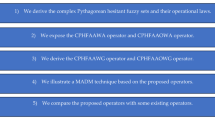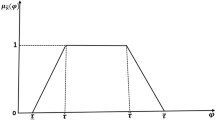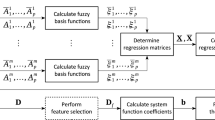Abstract
The concept of dense fuzzy sets instigates decision-makers to reduce the fuzziness of information. Occasionally, players are bound to change their predefined strategies as per the requirements of the circumstances in bimatrix game problems. Such irregular incidents provoke decision-makers to modify the payoffs of a bimatrix game. So, to deal with such irregularities, in this paper, we consider the payoffs of a bimatrix game in the form of dense fuzzy lock sets. Initially, considering players’ confidence level towards the information, we define a new defuzzification function, viz., weighted average defuzzification function (WADF). Later, we execute an auxiliary dense fuzzy non-linear programming problem to find the nash equilibrium strategies along with the value of the game for each player. Utilizing the proposed WADF, we transform the dense fuzzy non-linear programming problem into an equivalent crisp non-linear programming problem. Then we solve the reduced problem for different trials using the software MATHEMATICA 9.0. There are two vital observations of the present problem. One of them is the gradual increment of the value of the game with the increment of players’ confidence level towards the information at a fixed trial. Another fact is the significant changes in the value of the game occurred with the number of trials at a certain confidence level. Finally, to check the efficacy and the cogency of the methodology, we discuss the natural disaster management problem in the dense fuzzy scenario.


Similar content being viewed by others
References
Alharbi MG, Dagestani AA, Ammar ES (2020) Optimal solutions for constrained bimatrix games with payoffs represented by single valued trapezoidal neutrosophic numbers. J Math. https://doi.org/10.1155/2021/5594623
An JJ, Li DF, Nan JX (2017) A mean area ranking based non-linear programming approach to solve intuitionistic fuzzy bimatrix games. J Intel Fuzz Syst 33(1):563–573
Bector CR, Chandra S (2005) Fuzzy mathematical programming and fuzzy matrix games. Springer Verlag, Berlin
Bhaumik A, Roy SK, Li DF (2017) Analysis of triangular intuitionistic fuzzy matrix games using robust ranking. J Intel Fuzz Syst 33(1):327–336
Bhaumik A, Roy SK, Li DF (2021) \((\alpha ,\beta ,\gamma )-\)cut set based ranking approach to solving bi-matrix game in neutrosophic environment. Soft Comput 25:2729–2739
Brikaa MG, Zheng Z, Ammar ES (2020) Resolving indeterminacy approach to solve multi-criteria zero-sum matrix games with intuitionistic fuzzy goals. Mathematics 8(3):305. https://doi.org/10.3390/math8030305
Campos L, Gonzalez A, Vila MA (1992) On the use of the ranking function approach to solve fuzzy matrix games in a direct way. Fuzzy Sets Syst 49:193–202
Cui C, Feng Z, Tan C (2018) Credibilistic loss aversion nash equilibrium for bimatrix games with triangular fuzzy payoffs. Complexity. https://doi.org/10.1155/2018/7143586
Cui C, Feng Z, Tan C (2019) Bortokey. Loss aversion equilibrium of bimatrix games with symmetric triangular fuzzy payoffs. Int J Fuzz Syst 21:892–907
De SK (2018) Triangular dense fuzzy lock sets. Soft Comput 22(21):7243–7254
De SK, Beg I (2016) Triangular dense fuzzy sets and new defuzzification methods. J Intel Fuzzy Syst 31(1):469–477
De SK, Mahata GC (2019) An EPQ model for three-layer supply chain with partial back-ordering and disruption: triangular dense fuzzy lock sets approach. Sadhana 44:177. https://doi.org/10.1007/s12046-019-1160-7
Dubois D, Prade H (1980) Fuzzy sets and fuzzy systems, theory and applications. Academic Press, New York
Fan Z, Tan C (2020) Credibilistic bimatrix games with loss aversion and triangular fuzzy payoffs. Int J Fuzz Syst 20:1635–1652
Karmakar S, De SK, Goswami A (2018) A pollution sensitive remanufacturing model with waste items: triangular dense fuzzy lock set approach. J Clean Prod 187:789–803
Karmakar S, Seikh MR, Castillo O (2021) Type-2 intuitionistic fuzzy matrix games based on a new distance measure: application to biogas-plant implementation problem. Appl Soft Comput 106:107357. https://doi.org/10.1016/j.asoc.2021.107357
Khan I, Mehra A (2020) A novel equilibrium solution concept for intuitionistic fuzzy bi-matrix games considering proportion mix of possibility and necessity expectations. Granul Comput 5:461–483
Khan I, Aggarwal A, Mehra A (2016) Solving I-fuzzy bi-matrix games with I-fuzzy goals by resolving indeterminacy. J Uncertain Sys 10:204–222
Lai C, Chen X, Chen X, Wang Z, Wu Z, Zhao S (2015) A fuzzy comprehensive evaluation model for flood risk based on the combination weight of game theory. Nat Hazard 77:1243–1259
Larbani M (2009) Solving bimatrix games with fuzzy payoffs by introducing nature as a third party. Fuzzy Sets Syst 160:657–666
Li DF (2014) Decision and game theory in management with intuitionistic fuzzy sets. Springer-Verlag, Berlin Heidelberg, p 308
Li DF (2016) Linear programming models and methods of matrix games with pay-offs of triangular fuzzy numbers. Springer-Verlag, Berlin Heidelberg
Li CL (2021) Characterization of the equilibrium strategy of fuzzy bimatrix games based on L-R fuzzy variables. J Appl Math. https://doi.org/10.1155/2012/824790
Li S, Tu G (2022) Bi-matrix games with general intuitionistic fuzzy payoffs and application in corporate environmental behavior. Symmetry 14:671. https://doi.org/10.3390/sym14040671
Maeda T (2000) Characterization of the equilibrium strategy of the bimatrix game with fuzzy payoffs. J Math Anal Appl 251:885–896
Maity S, De SK, Mondal SP (2019) A study of an EOQ model under lock fuzzy environment. Mathematics 7(1):75. https://doi.org/10.3390/math7010075
Natural disasters risk in India (2020) Atlas Magazine. https://www.atlas-mag.net/en/article/natural-disasters-risk-in-india
Nayak PK, Pal M (2010) Bi-matrix games with intuitionistic fuzzy goals. Iran J Fuzzy Syst 7:65–79
Neumann JV, Morgenstern O (1944) Theory of games and economic behaviour. Princeton University Press, New York
Nisizaki I, Sakwa M (2000) Equilibrium solution in multiobjective bimatrix games with fuzzy payoffs and fuzzy goals. Fuzzy Sets Syst 111(1):99–116
Owen G (1995) Game Theory, 3rd edn. Academic Press, New York
Rubas DJ, Hill HSJ, Mjelde JW (2006) Economic and climate applications: exploring the frontier. Clim Res 33:43–54
Seaberg D, Devine L, Zhuang J (2017) A review of game theory applications in natural disaster management research. Nat Dis 89:1461–1483
Seikh MR, Karmakar S (2021) Credibility equilibrium strategy for matrix games with payoffs of triangular dense fuzzy lock sets. Sadhana 46:158. https://doi.org/10.1007/s12046-021-01666-5
Seikh MR, Nayak PK, Pal M (2015) Solving bi-matrix games with pay-offs of triangular intuitionistic fuzzy numbers. Eur J Pure Appl Math 8(2):153–171
Seikh MR, Karmakar S, Nayak PK (2020) Matrix games with dense fuzzy payoffs. Int J Intell Syst 17(4):25–40
Seikh MR, Dutta S, Li D-F (2021) Solution of matrix games with rough interval pay-offs and its application in the telecom market share problem. Int J Intell Syst 2021:1–35. https://doi.org/10.1002/int.22542
Tang M, Li Z (2020) A novel uncertain bimatrix game with Hurwicz criterion. Soft Comput 24:2441–2446
Vasconcelos MH, Santosh FC, Pacheco JM (2015) Cooperation dynamics of polycentric climate governance. Math Models Methods Appl Sci 25(13):2503–2517
Vidyottama V, Chandra S, Bector CR (2004) Bimatrix games with fuzzy goals and fuzzy payoffs. Fuzzy Optim Decis Mak 3:327–344
Xing Y, Qiu D (2019) Solving triangular intuitionistic fuzzy matrix game by applying the accuracy function method. Symmetry 11(10):1258. https://doi.org/10.3390/sym11101258
Xue W, Xu Z, Zeng XJ (2020) Solving matrix games based on Ambika method with hesitant fuzzy information and its application in the counter-terrorism issue. Appl Intel 51:1227–1243
Acknowledgements
The authors would like to acknowledge the Editor-in-Chief Prof. Derong Liu, and the anonymous learned reviewers for their constructive criticisms, invaluable suggestions, and cordial supports, which have been helpful to generate a better version of the present work.
Author information
Authors and Affiliations
Corresponding author
Additional information
Publisher's Note
Springer Nature remains neutral with regard to jurisdictional claims in published maps and institutional affiliations.
Rights and permissions
About this article
Cite this article
Karmakar, S., Seikh, M.R. Bimatrix games under dense fuzzy environment and its application to natural disaster management. Artif Intell Rev 56, 2241–2278 (2023). https://doi.org/10.1007/s10462-022-10220-6
Published:
Issue Date:
DOI: https://doi.org/10.1007/s10462-022-10220-6




